If you’ve ever wondered how to become a play therapist, this UK Guide on How to Become a Play Therapist is a great place to start.
Play Therapists use play — not just words — to help children cope with big emotions, trauma, or changes in their lives. Instead of talking through problems like adults do, they use toys, art, stories, and imagination to help children show what they’re feeling inside. It’s gentle, creative work that can truly change a child’s life.
This approach matters because play is a child’s natural language. Through play, children can process their feelings, build confidence, and begin to heal — even when talking feels too hard.
In the UK, if you want to know how to become a play therapist, most employers expect you to register with a recognised organisation such as BAPT or PTUK. You’ll also need to take part in regular supervision and continuing professional development (CPD) to keep learning and stay supported in your work.
What Is Play Therapy?
Play Therapy is a child-centred approach that helps children understand and express their feelings through play. Instead of talking like adults do in counselling, children use toys, art, stories, or sand to show what’s going on inside. Sessions happen in a safe, supportive space where the child feels comfortable being themselves.
There are a few different ways Play Therapists work. Some sessions are non-directive or child-led, meaning the child chooses what to play with while the therapist follows their lead and offers gentle support. Other sessions are more structured or directive, where the therapist suggests certain activities or themes to help the child explore specific emotions.
Play Therapists often use creative arts, sandtray therapy, or group play to help children share feelings, build confidence, and heal in ways that feel natural to them.
At its heart, Play Therapy helps children feel understood, accepted, and empowered — using the language they know best: play.
How to Become a Play Therapist
If you’re wondering how to become a play therapist, here’s the typical route in the UK:
- Begin with a relevant undergraduate degree, such as Psychology, Counselling, Education, or Social Work.
- Complete an accredited postgraduate Play Therapy programme, for example, a BAPT-accredited MSc/MA or the PTUK/APAC training pathway.
- Gain supervised clinical experience as part of your training to develop safe, practical skills.
- Register with a recognised UK body, such as BAPT or PTUK, both of which are listed on PSA-accredited registers.
- Maintain ongoing supervision and CPD (continuing professional development) to stay qualified and ensure high professional standards.
If you’re looking for a flexible, accredited route into this field, you can explore the Play Therapy Training Programme at the School of Health Care for more details on study options and pathways.
What Skills and Personal Qualities Help You as a Play Therapist?

To be a great Play Therapist, you need more than just training. You need the right mix of personal qualities and skills that help children feel safe, understood, and supported.
- Empathy and patience – You can connect with children on their level and give them time to share in their own way.
- Creativity – You use play, art, and imagination to help children express feelings they might not have words for yet.
- Good listening and observation – You notice what children say through their play, body language, and behaviour, even when they don’t speak.
- Ability to build trust quickly – You help children feel safe enough to open up and be themselves.
- Strong safeguarding awareness – You know how to protect children and keep clear, professional boundaries.
- Understanding of child development and trauma – You use a trauma-informed approach, always respecting each child’s age, background, and emotional needs.
All these qualities work together to create caring, ethical, and effective play therapy — where children feel truly seen and supported.
How Long Does It Take & What Are the Steps?
Becoming a Play Therapist doesn’t happen overnight, but every step helps you grow into the role. The journey usually takes a few years — and it’s truly worth it if you love helping children.
Most people start with an undergraduate degree, which takes about three years in the UK. This could be in Psychology, Counselling, Education, or Social Work — anything that helps you understand how children think, feel, and develop.
Next comes postgraduate training, such as a Diploma or Master’s in Play Therapy. This usually takes one to two years, sometimes longer if you study part-time. During this time, you’ll combine classroom learning with real-life placements, where you work directly with children under supervision.
As part of your training, you’ll complete supervised clinical hours to show you can safely and confidently support children in practice.
Once you qualify, the final step is to register with a recognised organisation like BAPT or PTUK. From there, you’ll keep learning through regular supervision and CPD (continuing professional development) — because good Play Therapists never stop growing.
Altogether, it usually takes around four to six years from your first degree to becoming a fully registered Play Therapist — but each step brings you closer to doing work that can truly change a child’s life.
Where Can You Train & Who Accredits Play Therapy Courses?
If you want to train as a Play Therapist in the UK, here are your main options:
- BAPT-accredited universities – Offer Master’s-level courses that include learning, creative play methods, and placements working with children.
- PTUK/APAC training – A route that mixes study with supervised practice and leads to registration with Play Therapy UK.
- Assessed practice and supervision – Both routes include real work with children and regular supervision during training.
- Check the course details – Always choose a training provider that clearly explains placement hours, supervision, and assessments. This helps make sure your qualification is properly recognised.
- Good place to start – The Play Therapy Training Programme at the School of Health Care is a flexible and trusted option for anyone ready to begin their journey into play therapy.
How to Gain Experience in Play Therapy While You Train
Getting real experience while you study is one of the best ways to become a confident Play Therapist. It helps you connect what you learn in class with real children’s emotions, play, and healing.
1. Volunteer or Work in Schools
Schools are full of opportunities to learn how children express themselves. You could help with emotional support sessions, lunchtime play groups, or classroom activities. Spending time with children in these settings helps you understand their feelings, behaviour, and what makes them feel safe.
2. Support Children’s Charities or Community Projects
Many charities support children going through tough times — like family changes, trauma, or special needs. Volunteering here helps you see how play, art, and creativity can comfort and empower children. You’ll meet professionals from different backgrounds and learn how they work together to help young people.
3. Get Involved with Family or Early Help Services
Family centres and early help teams are great places to learn how professionals support children before problems grow bigger. You might help run activities, support parents, or observe how families are guided through challenges with care and respect.
4. Shadow or Observe in CAMHS
If possible, spend time in Child and Adolescent Mental Health Services (CAMHS). Watching mental health professionals at work — or even helping with play-based activities — shows you how therapy is used in clinical settings. It’s a great way to understand what therapy looks like in practice.
5. Learn from Qualified Play Therapists
Whenever you can, shadow or talk to experienced Play Therapists. Seeing them work (with permission) helps you understand how they use play, listen deeply, and respond to a child’s emotions in the moment.
6. Keep Reflective Notes
As you gain experience, write reflective logs or journals about what you notice and how you feel. This habit helps you grow self-awareness — a key skill in any therapy work — and shows your supervisor how your learning is developing.
How Much Do Play Therapists Earn in the UK?
Play Therapist earnings in the UK can vary depending on where you work, your experience, and whether you are employed or self-employed.
If you work in the NHS, most Play Therapists are employed under Band 6 or Band 7 on the NHS pay scale.
- Band 6 roles usually start around £35,000 to £42,000 per year.
- Band 7 roles can range from £43,000 to £50,000+ per year, depending on experience and seniority.
Some therapists work in schools, local authorities, or charities, where pay levels are often similar to the NHS scale, though they may vary slightly by employer and funding.
Many experienced Play Therapists choose to work in private practice. In this setting, therapists usually charge per session, with rates that vary by region.
- Outside London, sessions often cost between £45 and £70.
- In London and the South East, fees are typically £70 to £100 per session or more.
Income in private practice depends on how many clients you see, your level of experience, your specialist areas, and how referrals reach you (for example, through schools, GPs, or self-referrals).
Overall, Play Therapy can offer a stable and meaningful career, with earnings that grow as your experience and reputation develop.
How Do You Start as a Play Therapist (Jobs & Practice)?
Once you’ve qualified as a Play Therapist, there are two main ways to begin your career — working for an organisation or starting your own private practice. Both paths can be deeply rewarding.
Starting Out in Employment
Many new Play Therapists begin by applying for employed roles where they can gain experience and regular supervision. You can find work in:
- Schools – supporting children who need help managing emotions or behaviour.
- NHS or CAMHS (Child and Adolescent Mental Health Services) – working as part of a wider mental health team.
- Charities and local authorities – helping children affected by trauma, family challenges, or special educational needs.
These roles provide valuable structure, guidance, and the chance to work alongside other professionals.
Starting a Private Practice
Some therapists choose to work for themselves, either part-time or full-time. Setting up a private practice gives you flexibility, but also means taking care of key responsibilities:
- Get professional insurance (public liability and professional indemnity).
- Arrange regular clinical supervision to ensure safe, reflective practice.
- Have strong safeguarding policies in place to protect children.
- Follow data protection (GDPR) rules for storing and handling client information.
- Set up clear referral pathways and know what to do in emergencies.
It’s also helpful to build a referral network — connect with local schools, GPs, and family support services so people know how to reach you.
Starting out as a Play Therapist takes planning and care, but every step helps you build a trusted, professional practice that truly supports children’s emotional growth.
To make this process easier, the School of Health Care also offers practical short courses in GDPR Training and Level 2 Safeguarding Children Training Course — ideal for Play Therapists who want to strengthen their professional knowledge and meet essential practice standards.
Challenges & Rewards of Being a Play Therapist
Being a Play Therapist is incredibly meaningful work — but it also comes with its own set of challenges. Knowing both sides helps you prepare for a balanced and rewarding career.
Challenges
Like all therapeutic roles, play therapy can be emotionally demanding. You’ll often support children who have faced trauma, loss, or difficult life changes, which can take an emotional toll. That’s why regular supervision is essential — it gives you space to reflect, get guidance, and stay grounded.
There are also practical challenges. You’ll need to invest in ongoing CPD (continuing professional development) to keep your skills fresh and meet registration standards, which can be costly and time-consuming. In addition, caseloads can vary, especially if you work in private practice, where demand might change from month to month.
Rewards
Despite the challenges, most Play Therapists describe the work as deeply fulfilling. You get to see real change in children — improved emotional regulation, growing confidence, and stronger relationships with family or caregivers.
The work is also creative and varied. Every session is different, and you get to use art, sand, stories, and imagination to help children express and heal.
Plus, Play Therapy offers flexibility — you can work in schools, the NHS, charities, or your own private practice. Over time, many therapists develop special interests, like trauma recovery, attachment work, or neurodiversity support, which makes the career even more meaningful.
In short, the challenges are real — but the rewards are powerful. You’ll witness growth, healing, and connection every day, which makes all the effort truly worthwhile.
Final Thoughts: Is Play Therapy Right for You?
If you’re someone who cares deeply about children and believes in the power of creativity, empathy, and patience, Play Therapy could be the perfect path for you. It’s a career that asks for emotional strength and self-awareness but gives back something truly special — the chance to help children heal, grow, and find their voice through play.
You’ll need to be ready for ongoing learning, regular supervision, and moments that can feel both challenging and deeply moving. But if you’re drawn to working with children in a compassionate, hands-on way, the rewards far outweigh the effort.
Play Therapy isn’t just a job — it’s a calling to understand children on their level and walk beside them as they make sense of their world, one play session at a time.
If you’d like to strengthen your skills and ensure a safe, supportive environment for every child you work with, explore the Health and Safety courses at the School of Health Care.
FAQs
What qualifications do I need to be a play therapist?
You’ll need a relevant degree plus a postgraduate Play Therapy qualification accredited by BAPT or PTUK, with supervised clinical practice included.
How to become an NHS play therapist?
Gain a BAPT or PTUK-accredited qualification, register professionally, and apply for NHS Band 6–7 roles in CAMHS or child mental health teams.
How much do play therapists get paid?
NHS Play Therapists earn roughly £35k–£50k. In private practice, session fees vary—typically £45–£100 depending on region and experience.
How long is a play therapist course?
Undergraduate study takes about three years; postgraduate Play Therapy training adds one to two years, often part-time with supervised placements.
Is there a demand for play therapists?
Yes, demand is rising in schools, charities, and mental health services as awareness of children’s emotional well-being and trauma-informed care grows.
Can you do play therapy without a degree?
No, you need a relevant degree before postgraduate Play Therapy training. Experience with children helps but can’t replace formal qualifications.
What type of child therapist makes the most money?
Private Play Therapists or clinical specialists with advanced training and strong referral networks usually earn the highest incomes in child therapy.
What are the 5 stages of play therapy?
The stages are: engagement, resistance, working through, growth, and termination — reflecting how trust, expression, and healing develop over time.



